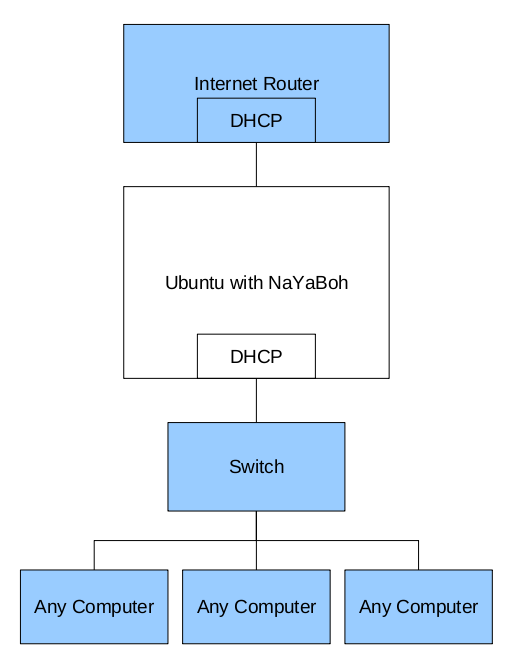
NaYaBoh is completely free to use. This is so because all it's parts are licensed under open source licenses. If you want to learn more about open source you can start reading here: http://www.gnu.org/ and http://opensource.org/
To run NaYaBoh you need the following things:
Where can you get this things from?
With the computer I can not help you. I can just tell you that it can be any ordinary old computer. The only requirement is that there are two network cards.

Example of NaYaBoh hardware used in Limbe
See this example, it was send to me from a school in Limbe, Cameroon. They installed NaYaBoh on a mini itx board (www.pcengines.ch) which consumes only 5 watts. The operating system is on a 1 GB flash device. The board has only one Ethernet card, the second network card is as USB Ethernet adapter. (Thank you Michel, for this example)
Since Windows is not free you should use any GNU/Linux (which is free) for NaYaBoh. In fact NaYaBoh is NOT running on Windows.
Ubuntu is a very
user-friendly version of Linux. So I recommend that you use it,
since I also test NaYaBoh on it. You can download Ubuntu here:
http://www.ubuntu.com/GetUbuntu/download
It is best to use the LTS version (long term support).
If you are an experienced Linux user you can also try the
Ubuntu server version or any Debian.
Important:
Since there is only one package for different Linux distributions
it is always possible that there are problems.
For now I know the following issues and make the following
recommendations:
You can download NaYaBoh directly from where it is developed.
Use this link: https://sourceforge.net/projects/nayaboh/files/
There is an additional package called "nayaboh-gui" - it is
optional to install and provides a small graphical user interface
for some (but not all) functions of NaYaBoh.
Remember that there is no warranty of functionality. Make sure that you download the most recent version, since this is most likely the best one.
First you need to make sure that you connect everything correctly.
Your Internet router should give dynamic IP (DHCP), so that NaYaBoh will receive one automatically.
It is not very simple to know which network card has to be pluged to the Internet and which to the local switch. I have no simple "howto" for now. Just try your luck and all your intelligence :-)

Setup of NaYaBoh
Installing Ubuntu should be even more easy than installing Windows. Burn it on a CD and start the Computer using this CD. Then follow the instructions.
Installing NaYaBoh is actually very simple. Just put the file which you have downloaded on as USB flash and drag it on the Ubuntu Desktop. A simple double click on the file should start the installation routine.
If you have an error (concerning "dnsmasq") at the very beginning this is most likely because Ubuntu could not update it's available packages during the installation. To solve this open in the menu Applications -> Accessories -> Terminal and type the following:
sudo aptitude update
After pressing Enter you will be asked for your user password. The update should be done now (Internet required). If you are now asked to upgrade your system, don't do it, it will eat your Internet for nothing.
Double click again the package to start the installation. The installation process also needs Internet, because he is downloading additional software. Actually it is downloading the main operating software, NaYaBoh just does the configuration.
Since Debian is a little different from Ubuntu (actually it's the other way round) and more for advanced system administrators, there are some things you need to know if you use NaYaBoh on Debian.
gdebi to install
NaYaBoh, it will resolv all dependencies.When you connect your computers over a switch to NaYaBoh make sure that they are configured to receive their network configuration by DHCP. In Windows you have to do it like in the picture.

Configure your Windows clients like this
Apart from that there is not much to do. The NaYaBoh machine just needs to be on.
This website is standard
conform.
This website was last updated
for the NaYaBoh 0.4.3 and GUI 0.1 release.